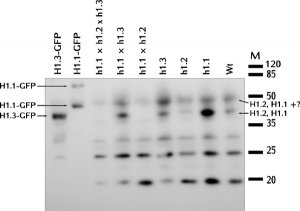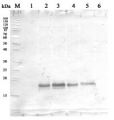1

Anti-H1 | Histone H1
AS11 1801 | Clonality: Polyclonal | Host: Rabbit | Reactivity: A. thaliana, N. tabacum
- Product Info
-
Immunogen: native H1 protein purified from Nicotiana tabaccum (H1A, H1B H1C,D,E,F) Host: Rabbit Clonality: Polyclonal Purity: Immunogen affinity purified serum in PBS pH 7.4. Format: Lyophilized Quantity: 50 µg Reconstitution: For reconstitution add 50 µl of sterile water Storage: Store lyophilized/reconstituted at -20°C; once reconstituted make aliquots to avoid repeated freeze-thaw cycles. Please remember to spin the tubes briefly prior to opening them to avoid any losses that might occur from material adhering to the cap or sides of the tube. Tested applications: Chromatin Immunoprecipitation (ChIP), Western blot (WB), Immunocytochemistry (ICC) (ICC) Recommended dilution: 1 : 100-1 : 500 (ICC), 1 : 5000 (WB) Expected | apparent MW: 15 | 17 kDa
- Reactivity
-
Confirmed reactivity: Arabidopsis thaliana, Nicotiana tabacum, Triticum aestivum Predicted reactivity: Lathyrus sativus, Phaseolus vulgaris, Pisum sativum, Solanum lycopersicum, Vicia faba
Species of your interest not listed? Contact usNot reactive in: No confirmed exceptions from predicted reactivity are currently known - Application Examples
-
Western blot 
50 µl of a total protein from Arabidopsis thaliana leafs (wt and single, double and triple H1 mutants as well as overexpressed H1 as a GFP fusion) extracted in a following way: samples were grinded in LN2, suspended in 1xSDS buffer (sample:buffer 1:5), sonicated (10 min., max. power, in ice-cooled sonicating bath (BioRuptor, Diagenode, Belgium) and were separated on 15 % SDS-PAGE and blotted 2h to PVDF(Millipore Westran). Blots were blocked with 5 % non-fat milk TBST for 1h at room temperature (RT) with agitation. Blot was incubated in the primary antibody at a dilution of 1: 5 000 for over night at 4°C with agitation. The antibody solution was decanted and the blot was rinsed and washed four times for 10 min in TBS-T at RT with agitation in 2.5 % non-fat milk in YBST. Blot was incubated in secondary antibody (anti-rabbit IgG horse radish peroxidase conjugated,from Agrisera, AS09 602) diluted to 1:10 000 in for 1h at RT with agitation. The blot was washed as above and developed for 5 min with a home made ECL. Exposure time was 5 min.
Courtesy of Dr. Maciej Kotliński, Institute of Biochemistry and Biophysics of Polish Academy of Sciences in Warsaw, Poland
Immunolocalization
Whole-mount immunostaining on Arabidopsis thaliana ovule primordia stage 2-II. Steps involved: clarification (methanol/xylene), cell wall digestion and permeabilization before application of the primary, then secondary antibody for 12-14 hours at 4°C; fixation: BVO buffer: buffer from (Bauwens and Van Oostveld 1996), 2mM EGTA pH7.5, 10% DMSO, 1% Tween in PBS (containg 1% formaldehyde) for 30 min. rotating/shaking plate RT; blocking: none; counterstaining: propidium iodide and mounted in Prolong Gold (Invitrogen); primary antibody dilution: 1:200 in PBS + 0.2% Tween-20; secondary antibody dilution: 1:200 at 4°C, 24h, goat anti-rabbit IgG Alexa 488 conjugated (Molecular Probes (A11008)).
H1 immunostaining in Arabidopsis thaliana ovule primordia stage 2-II is in accordance with H1.1-GFP expression pattern (She et al 2013 et al. 2013).
Courtesy of Dr. Kinga Rutowicz, IBB PAS, Warsaw, Poland, with the technical assistance of Drs. Wenjing She and Célia Baroux, University of Zürich, Switzerland. - Background
-
Background: Histone 1 (H1) is a protein located in nuclei, incorporated into chromatin.
- Product Citations
-
Selected references: Rutowicz et al. (2019). Linker histones are fine-scale chromatin architects modulating developmental decisions in Arabidopsis. Genome Biol. 2019 Aug 7;20(1):157. doi: 10.1186/s13059-019-1767-3. (western blot, immunolocalization)
Benoit et al. (2018). Replication-coupled histone H3.1 deposition determines nucleosome composition and heterochromatin dynamics during Arabidopsis seedling development. New Phytol. 2018 Jun 13. doi: 10.1111/nph.15248.
Wollmann et al. (2017). The histone H3 variant H3.3 regulates gene body DNA methylation in Arabidopsis thaliana. Genome Biol. 2017 May 18;18(1):94. doi: 10.1186/s13059-017-1221-3.
She and Baroux (2015). Chromatin dynamics in Pollen Mother Cells underpin a common scenario at the somatic-to-reproductive fate transition of both the male and female lineages in Arabidopsis. Front. Plant Sci. | doi: 10.3389/fpls.2015.00294.
She et al. (2013). Chromatin reprogramming during the somatic to-reproductive cell fate transition in plants. Development Oct;140(19):4008-19. doi: 10.1242/dev.095034. Epub 2013 Sep 4. (Arabidopsis thaliana, immunostaining) - Protocols
-
Agrisera Western Blot protocol and video tutorials
Protocol for immunostatining in whole-mount plant tissues: An efficient method for quantitative, single-cell analysis of chromatin modification and nuclear architecture in whole-mount ovules in Arabidopsis. Wenjing She, Daniel Grimanelli, Célia Baroux, J Vis Exp. 2014; (88): 51530.
Preparation of cytosolic and nuclear protein fractions
1. Prepare protoplasts from 50 ml Arabidopsis thaliana cell culture according to the protocol of PEG transfection.
2. Resuspend protoplasts in 10 ml GH buffer and keep the solution on ice for 10 min.
GH buffer: 100mM glycine
0.1% Hexylene glycol
0.37M (4.7% w/v) saccharose
0.3mM Spermine
1.0mM Spermidine
pH 8.3 with Ca(OH)2
3. To release nuclei add Triton X100 to a final concentration of 0.1%. Pipetting gently up and down several
times with a plastic pipette might be necessary to lyse cells.
4. After 5min sediment nuclei by centrifugation at 1000 xg for 15 min at 4°C. Save supernatant as the
cytoplasmic fraction. Wash the pelleted nuclei two times with GHT (GH+0.1% TX100) then finally
resuspended in a suitable volume of extraction buffer + protease inhibitors. - Reviews:
-
This product doesn't have any reviews.


